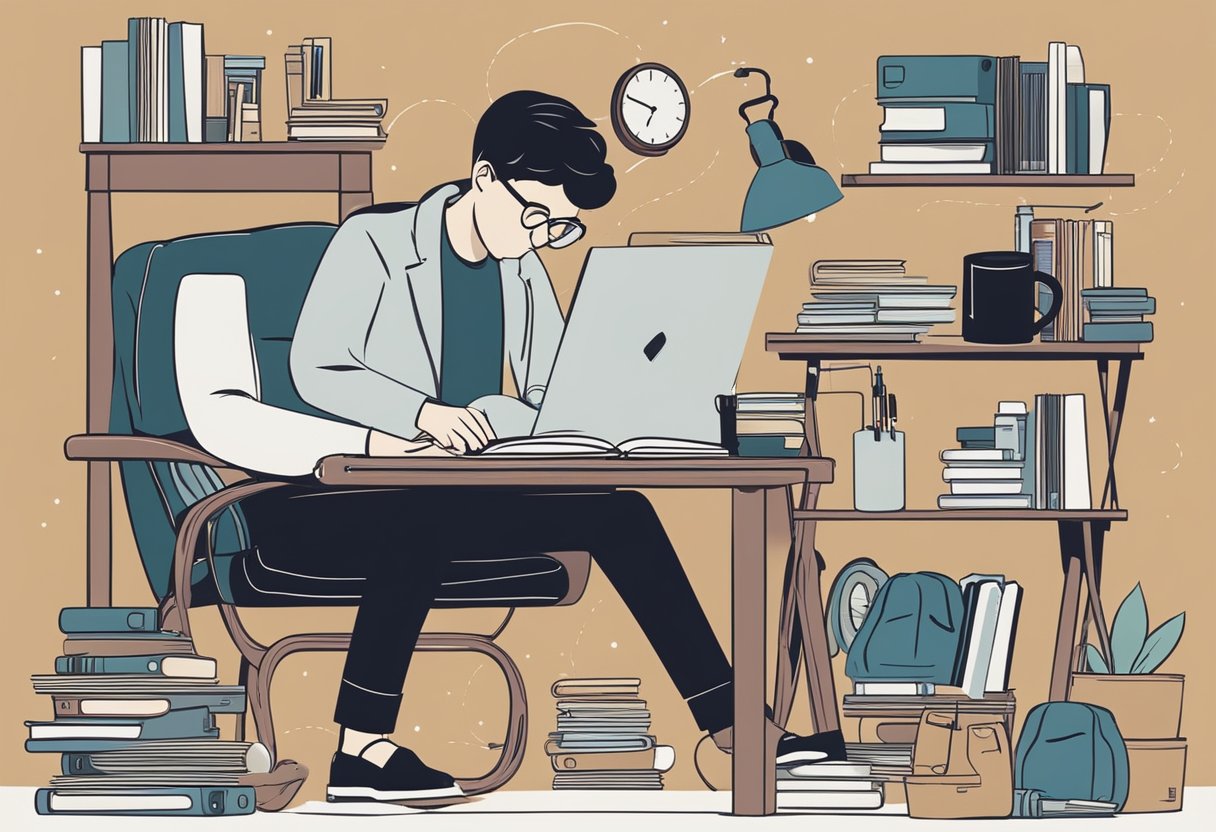Understanding Anxiety and Depression
Anxiety and depression are two common mental health conditions that can significantly impact daily life. These disorders can affect anyone and come with a range of symptoms and causes. This section examines their definitions, prevalence, and contributing factors.
Definitions and Differences
Anxiety is characterized by excessive worry, fear, or apprehension. People with anxiety may experience physical symptoms like increased heart rate and sweating. Common anxiety disorders include Generalized Anxiety Disorder, Panic Disorder, and Social Anxiety Disorder.
Depression, on the other hand, involves persistent feelings of sadness and loss of interest in activities. Symptoms may include fatigue, changes in appetite, and difficulty concentrating. Major Depressive Disorder is one of the most recognized forms of depression.
While anxiety and depression can occur separately, they often co-occur, complicating psychological diagnosis and treatment.
Prevalence and Statistics
In the United States, nearly 40 million adults, or 18%, experience anxiety disorders each year. Among youth, 8% of children and teenagers face similar challenges, often developing symptoms before age 21.
Depression, meanwhile, affects around 322 million people worldwide, according to the World Health Organization. This statistic highlights the global impact of this condition. Understanding these rates is crucial for recognizing how common these issues are and the importance of seeking help.
Biological and Psychological Factors
Biological factors play a significant role in both anxiety and depression. Genetics can influence an individual’s vulnerability to these disorders. Neurotransmitters like serotonin and dopamine also affect mood regulation.
Psychological factors include thought patterns and behaviors. Cognitive distortions, such as negative thinking, can exacerbate both anxiety and depression. Stressful life events, trauma, and prolonged emotional distress can further contribute to the onset of these conditions.
Recognizing these factors can guide effective treatment and management strategies.
Symptoms and Diagnosis

Recognizing anxiety and depression involves understanding specific symptoms and seeking the right diagnosis. Identifying these signs can lead to effective management and treatment.
Identifying Symptoms
The symptoms of anxiety and depression can overlap but often have distinct characteristics.
Common symptoms of depression include:
- Persistent Sadness: A low mood that lasts most days.
- Loss of Interest: No longer finding joy in activities once enjoyed.
- Sleep Issues: Difficulty falling asleep, staying asleep, or sleeping too much.
- Appetite Changes: Significant weight gain or loss without trying.
Common symptoms of anxiety include:
- Excessive Worry: Constantly feeling worried or anxious about various aspects of life.
- Restlessness: A feeling of being on edge or unable to relax.
- Physical Symptoms: Such as rapid heartbeat, sweating, or trembling.
Recognizing a mix of these symptoms is key to understanding one’s mental health.
Professional Diagnosis
Seeking a professional diagnosis is crucial for effective treatment. Mental health providers use various methods to evaluate the presence of anxiety or depression.
- Clinical Interviews: These help the provider gather information about symptoms, feelings, and personal history.
- Psychological Assessments: Standardized questionnaires may be given to determine the severity of symptoms.
- Diagnostic Criteria: Health professionals refer to criteria from the DSM-5 (Diagnostic and Statistical Manual of Mental Disorders) to confirm a diagnosis.
A thorough evaluation ensures that the individual receives an accurate diagnosis and appropriate treatment plan.
Self-Assessment Tools
Self-assessment can be an initial step in recognizing mental health issues. Several tools are available for individuals to evaluate their symptoms.
- Questionnaires: Simple questionnaires, like the Beck Depression Inventory or Generalized Anxiety Disorder 7-item scale (GAD-7), help assess feelings of sadness or anxiety.
- Mood Tracking: Keeping a journal of daily moods and triggers can identify patterns over time.
- Support Apps: Mobile apps often provide check-ins and tips for managing feelings of anxiety and depression.
Using these tools can help individuals understand their mental health before seeking professional help.
Treatment Options

Treatment for anxiety and depression often includes medication, psychotherapy, and alternative methods. Each option has specific approaches to help manage symptoms effectively.
Medication
Medications play a key role in treating anxiety and depression. Common types include:
Do you struggle with depression?
We have clinicians expert on depression, feel free to read about them, or book a free consultation to review your situation.
- SSRIs (Selective Serotonin Reuptake Inhibitors): These help increase serotonin levels, improving mood.
- SNRIs (Serotonin-Norepinephrine Reuptake Inhibitors): These target both serotonin and norepinephrine, effective for anxiety and chronic depression.
- NDRIs (Norepinephrine/Dopamine Reuptake Inhibitors): These focus on norepinephrine and dopamine, offering energy to those feeling lethargic.
Patients should work closely with a doctor to find the right medication. Dosage and side effects can vary, making regular follow-ups important. Many benefit from medication combined with therapy. For more personalized care, individual counseling may provide support alongside medication.
Psychotherapy
Psychotherapy has many forms, but two commonly used types are:
- Cognitive-Behavioral Therapy (CBT): This method focuses on changing negative thought patterns. It teaches skills to manage anxiety and depression effectively.
- Interpersonal Therapy (IPT): This approach emphasizes relationships and social functioning. It helps individuals express emotions and enhance communication skills.
Therapists tailor these therapies to fit individual needs. Sessions can vary in length and frequency. Engaging in consistent therapy can greatly improve mental health outcomes. For those interested, professional counseling services can be found for more guidance.
Alternative Treatments
Alternative treatments can complement traditional methods. Some popular options include:
- Mindfulness and Meditation: These practices help in reducing stress by focusing on the present moment.
- Exercise: Regular physical activity is known to boost mood and reduce anxiety.
- Dietary Changes: A balanced diet can influence energy levels and mental health.
Though not replacements for standard treatments, alternative methods can be beneficial. It’s important for individuals to discuss these options with their healthcare provider. For more tailored support, seeking counseling might be helpful in exploring these alternatives.
Coping Strategies and Support

Coping with anxiety and depression requires a mix of daily techniques, long-term management, and support systems. Each person’s experience is unique, and finding the right strategies can significantly improve well-being.
Daily Coping Techniques
Daily coping techniques can help manage symptoms effectively. Incorporating small changes can lead to big benefits.
- Exercise Regularly: Physical activity releases endorphins, which can boost mood. Even a short walk can make a difference.
- Practice Mindfulness: Mindfulness and meditation can reduce stress. Spend a few minutes each day focusing on breathing or being present.
- Maintain a Routine: Having a set schedule can provide structure. This is helpful for managing anxiety and creating a sense of control.
Additionally, reducing caffeine and sugar intake can also help in minimizing anxiety symptoms. Keeping a journal can be beneficial too, as it allows for expression of feelings and tracking moods over time.
Long-Term Management
Long-term management involves a deeper approach to addressing anxiety and depression. Professional help is often vital.
- Therapy Options: Cognitive-behavioral therapy (CBT) is effective for many individuals. It helps change negative thinking patterns.
- Medication: In some cases, medications can stabilize mood. It is important to consult with a healthcare provider to find the right option.
- Support Groups: Joining a support group provides a platform to share experiences. This can reduce feelings of isolation.
Incorporating healthy habits, such as balanced nutrition and sufficient sleep, also plays a crucial role in long-term management.
Building a Support Network
A strong support network is essential for those facing anxiety and depression. Connecting with others helps in many ways.
- Family and Friends: Reaching out to family and friends can provide emotional support. They can offer encouragement and understanding.
- Professional Support: Mental health professionals can guide individuals in their journey. Regular check-ins with a therapist or counselor are beneficial.
- Community Resources: Local groups and organizations provide additional support. They can connect individuals with others facing similar challenges.
Establishing a support network creates a safety net. This ensures that individuals have people to turn to in difficult times, enhancing their ability to cope.
Frequently Asked Questions

This section addresses common inquiries about anxiety and depression to help individuals gain a better understanding of these conditions. It offers insights into symptoms, treatment options, and supportive lifestyle changes.
What are the common symptoms of Generalized Anxiety Disorder (GAD)?
Common symptoms of Generalized Anxiety Disorder include persistent worry, restlessness, fatigue, and difficulty concentrating. Physical symptoms may also occur, such as muscle tension and sleep disturbances. People may feel easily startled and have trouble relaxing.
How can cognitive behavioral therapy (CBT) help with depression?
Cognitive Behavioral Therapy helps individuals identify and change negative thought patterns. It focuses on providing tools to cope with feelings of sadness and helplessness. CBT can lead to significant improvements in mood and functioning, often within 12 to 16 weeks.
What lifestyle changes can support the management of anxiety?
Lifestyle changes that may help manage anxiety include regular physical activity, healthy eating, and good sleep hygiene. Mindfulness practices, such as meditation or yoga, can also reduce stress levels. These small steps can significantly enhance overall well-being.
What are the different types of depression and their characteristics?
Different types of depression include major depression, persistent depressive disorder, and seasonal affective disorder. Major depression involves overwhelming sadness and loss of interest in activities. Persistent depressive disorder lasts for a long time, often with less severe symptoms.
How does one differentiate between normal stress and an anxiety disorder?
Normal stress usually comes from specific situations and resolves when those situations change. In contrast, anxiety disorders involve excessive worry and fear that persist over time. Symptoms of an anxiety disorder often interfere with daily life and function.
What role does medication play in the treatment of anxiety and depression?
Medication can be an important part of treating anxiety and depression. It may help balance chemicals in the brain and reduce symptoms. Finding the right medication often requires time and patience, as responses can vary greatly among individuals.
Do you struggle with depression?
We have clinicians expert on depression, feel free to read about them, or book a free consultation to review your situation.
